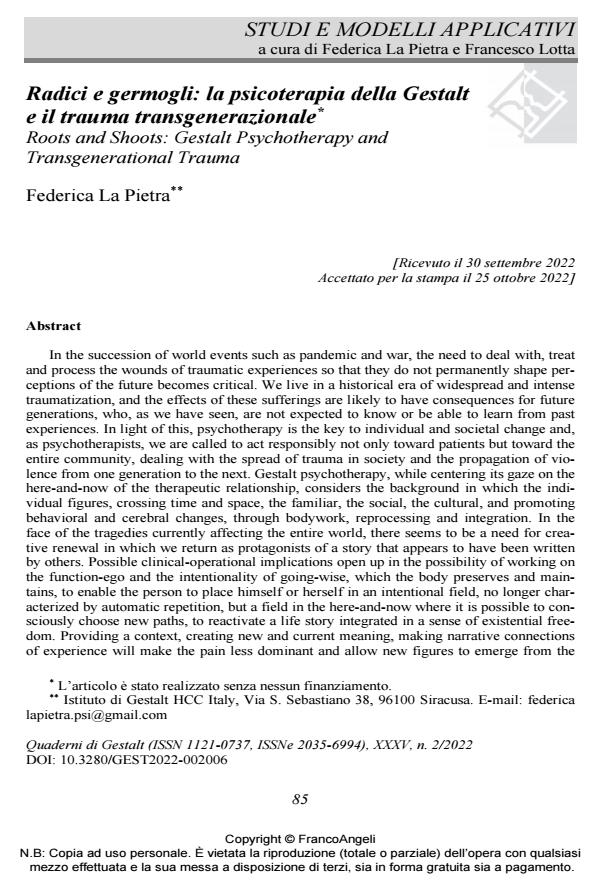Roots and Shoots: Gestalt Psychotherapy and Transgenerational Trauma
Journal title QUADERNI DI GESTALT
Author/s Federica La Pietra
Publishing Year 2022 Issue 2022/2
Language Italian Pages 11 P. 85-95 File size 175 KB
DOI 10.3280/GEST2022-002006
DOI is like a bar code for intellectual property: to have more infomation
click here
Below, you can see the article first page
If you want to buy this article in PDF format, you can do it, following the instructions to buy download credits

FrancoAngeli is member of Publishers International Linking Association, Inc (PILA), a not-for-profit association which run the CrossRef service enabling links to and from online scholarly content.
In the succession of world events such as pandemic and war, the need to deal with, treat and process the wounds of traumatic experiences so that they do not permanently shape per-ceptions of the future becomes critical. We live in a historical era of widespread and intense traumatization, and the effects of these sufferings are likely to have consequences for future generations, who, as we have seen, are not expected to know or be able to learn from past ex-periences. In light of this, psychotherapy is the key to individual and societal change and, as psychotherapists, we are called to act responsibly not only toward patients but toward the en-tire community, dealing with the spread of trauma in society and the propagation of violence from one generation to the next. Gestalt psychotherapy, while centering its gaze on the here-and-now of the therapeutic relationship, considers the background in which the individual fig-ures, crossing time and space, the familiar, the social, the cultural, and promoting behavioral and cerebral changes, through bodywork, reprocessing and integration. In the face of the trag-edies currently affecting the entire world, there seems to be a need for creative renewal in which we return as protagonists of a story that appears to have been written by others. Possi-ble clinical-operational implications open up in the possibility of working on the function-ego and the intentionality of going-wise, which the body preserves and maintains, to enable the person to place himself or herself in an intentional field, no longer characterized by automatic repetition, but a field in the here-and-now where it is possible to consciously choose new paths, to reactivate a life story integrated in a sense of existential freedom. Providing a context, creating new and current meaning, making narrative connections of experience will make the pain less dominant and allow new figures to emerge from the background, sustaining the ten-sion toward the future, rather than a staticity in the past, new shoots on ancient roots.
Keywords: Trauma, transgenerational, epigenetics, traumatic memory, psychopathology.
Federica La Pietra, Radici e germogli: la psicoterapia della Gestalt e il trauma transgenerazionale in "QUADERNI DI GESTALT" 2/2022, pp 85-95, DOI: 10.3280/GEST2022-002006